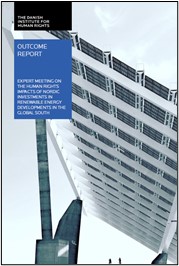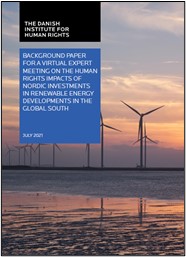The climate emergency poses a huge threat to human rights. In order to address the climate crisis, a transition to an economy respectful of the planet is urgently required. As part of this green transition, moving away from fossil energy sources, towards renewable energy is critical. In order for the energy transition to contribute to the realisation of the SDGs and human rights, the renewable energy sector must also be sustainable in itself. As with any other parts of the energy sector, the renewable energy sector is associated with a number of social and human rights related challenges.
The Danish Institute for Human Rights organised an expert meeting gathering over twenty experts and practitioners from the Nordic region as well as the Global South, representing the renewable energy sector, public institutions, civil society organizations and subject matter experts as well as financial sector actors. The aim of the meeting was to identify salient human rights impacts and critical questions associated with Nordic investments in renewable energy development, with a particular focus on the role of company and financial sector investments in the Global South, and to discuss strategies and opportunities to address these.
This outcome report captures the main take aways from the meeting focusing on human rights due diligence and access to remedy, impacts on indigenous peoples’, women’s rights and the role of the financial sector. In addition, a background paper was prepared to provide an introduction to some of the issues discussed during the expert meeting.
Outcome Report: – On 27 April 2021 the Danish Institute for Human Rights (DIHR) hosted a two-and-a-half-hour expert meeting on human rights impacts of Nordic investments in renewable energy in the Global South. The meeting gathered 20+ experts and practitioners from the Nordic region as well as the Global South, representing the renewable energy sector, public institutions, civil society organizations and subject matter experts as well as financial sector actors and was held under the Chatham House Rule. Accordingly, this report aims to share the richness of the discussions held but does not attribute views or information to their sources nor include any verbatim quotations. Moreover, the DIHR does not necessarily adhere to any of the views expressed by participants.
Background Paper: – This short briefing has been prepared to serve as a background paper for a virtual expert meeting on the human rights impacts of Nordic investments in renewable energy developments in the Global South. Convened by the Danish Institute for Human Rights (DIHR), the expert meeting will gather a group of key experts and stakeholders working in the field of Nordic renewable energy, investment and human rights to map out key human rights issues, questions, impacts, challenges, opportunities and ways forward to ensure that Nordic companies and financiers, of renewable energy projects fully integrate respect for human rights in their endeavour to contribute to the transition to clean energy sources which at the same time is respectful of human rights. The background paper has been prepared based on desktop research only and seeks to provide a non-exhaustive introduction to some of the issues that may be discussed during the roundtable, rather than comprehensive research on the subject matter.


